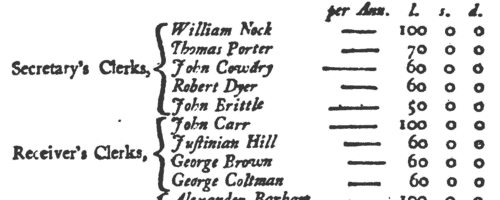Add this eBook to your basket to receive access to all 93 records. Our indexes include entries for the spelling hewet. In the period you have requested, we have the following 93 records (displaying 61 to 70): These sample scans are from the original record. You will get scans of the full pages or articles where the surname you searched for has been found. Your web browser may prevent the sample windows from opening; in this case please change your browser settings to allow pop-up windows from this site. Treasury Books
(1716)
Records of the Treasury administration in Britain, America and the colonies, for 1716. These also include records of the appointment and replacement of customs officers such as tide waiters and surveyors. | Sample scan, click to enlarge

| Treasury Books
(1717)
Records of the Treasury administration in Britain, America and the colonies, for 1717. These also include records of the appointment and replacement of customs officers such as tide waiters and surveyors. | Sample scan, click to enlarge

| Treasury and Customs Records
(1718)
Government accounts, with details of income and expenditure in Britain, America and the colonies
| Sample scan, click to enlarge

|  Masters and Apprentices
(1724) Masters and Apprentices
(1724)
Apprenticeship indentures and clerks' articles were subject to a 6d or 12d per pound stamp duty: the registers of the payments usually give the master's trade, address, and occupation, and the apprentice's father's name and address, as well as details of the date and length of the apprenticeship. 2 January to 2 May 1724. | Sample scan, click to enlarge

|  Masters and Apprentices
(1725) Masters and Apprentices
(1725)
Apprenticeship indentures and clerks' articles were subject to a 6d or 12d per pound stamp duty: the registers of the payments usually give the master's trade, address, and occupation, and the apprentice's father's name and address, as well as details of the date and length of the apprenticeship. 2 January to 14 August 1725. | Sample scan, click to enlarge

|  Apprentices registered at Leicester
(1723-1726) Apprentices registered at Leicester
(1723-1726)
Apprenticeship indentures and clerks' articles were subject to a 6d or 12d per pound stamp duty: the registers of the payments usually give the master's trade, address, and occupation, and the apprentice's father's name and address, as well as details of the date and length of the apprenticeship. There are central registers for collections of the stamp duty in London, as well as returns from collectors in the provinces. These collectors generally received duty just from their own county, but sometimes from further afield. Because of the delay before some collectors made their returns, this register includes indentures and articles from as early as 1722. (The sample entry shown on this scan is taken from a Norfolk return) | Sample scan, click to enlarge

|  Masters of Apprentices registered at Norwich in Norfolk
(1723-1726) Masters of Apprentices registered at Norwich in Norfolk
(1723-1726)
Apprenticeship indentures and clerks' articles were subject to a 6d or 12d per pound stamp duty: the registers of the payments usually give the master's trade, address, and occupation, and the apprentice's father's name and address, as well as details of the date and length of the apprenticeship. There are central registers for collections of the stamp duty in London, as well as returns from collectors in the provinces. These collectors generally received duty just from their own county, but sometimes from further afield. Because of the delay before some collectors made their returns, this register includes indentures and articles from as early as 1722. (The sample entry shown on this scan is taken from a Norfolk return) | Sample scan, click to enlarge

|  Masters of Apprentices registered in Northumberland
(1728-1731) Masters of Apprentices registered in Northumberland
(1728-1731)
Apprenticeship indentures and clerks' articles were subject to a 6d or 12d per pound stamp duty: the registers of the payments usually give the master's trade, address, and occupation, and the apprentice's father's name and address, as well as details of the date and length of the apprenticeship. There are central registers for collections of the stamp duty in London, as well as returns from collectors in the provinces. These collectors generally received duty just from their own county, but sometimes from further afield. (The sample entry shown on this scan is taken from a Norfolk return) | Sample scan, click to enlarge

| The Royal Household Below Stairs
(1741)
'A General List, or Catalogue, Of all the Offices and Officers Employ'd In the several Branches of his Majesty's Government Ecclesiastical, Civil, Military, &c. In South-Britain, or England' gives the names (and often the annual salaries) of the government functionaries, civil servants, churchmen and military, systematically arranged section by section. Section 81 lists his Majesty's Household Officers and Servants attending in the several Offices Below Stairs, arranged by department - the Board of Green Cloth; Accompting House; Bake House; Pantry; Buttery; Cellar; Spicery; Confectionery; Ewry; Laundress; King's Privy Kitchen; Queen's Privy Kitchen; Household Kitchen; Larder; Acatery; Poultry; Scalding House; Pastry; Scullery; Wood Yard; Harbingers; Almoner; Gate Porters; Verge; Bread Bearer; Wine Porters; Table Deckers and Purveyors; and staff at Somerset House and Marshalsea. | Sample scan, click to enlarge

|  Masters and Apprentices
(1753) Masters and Apprentices
(1753)
Apprenticeship indentures and clerks' articles were subject to a 6d or 12d per pound stamp duty: the registers of the payments usually give the master's trade, address, and occupation, and the apprentice's father's name and address, as well as details of the date and length of the apprenticeship. | Sample scan, click to enlarge

|
Research your ancestry, family history, genealogy and one-name study by direct access to original records and archives indexed by surname.
|












